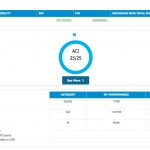During the 2017 MIPS transition year, eligible clinicians faced many challenges, including extreme and uncontrollable disasters, such as the California wildfires and Hurricanes Harvey, Irma and Maria. In light of this and the understanding that practices may not be able to collect or submit program data for an extended period of time, the Centers for Medicare & Medicaid Services (CMS) issued an interim final rule with comment period (CMS-5522-IFC) that addresses the widespread catastrophic events and the areas affected. If you are in an affected area and are not reporting through a MIPS Alternative Payment Model program, you may be exempt from 2017 reporting.
The Neutral Adjustment
According to the CMS, under this policy, if you were affected by Hurricanes Harvey, Irma or Maria, or the Northern California wildfires, you will not be burdened with submitting an application to reweight the performance categories; instead, mechanisms have been put in place for the CMS to automatically identify your practice. This means if you’re an affected MIPS-eligible clinician, you will automatically receive a neutral MIPS payment adjustment, unless you submit data for any of the MIPS performance categories by the submission deadline for 2017 (March 31, 2018), in which case you will be scored on each performance category for which you submit data, according to existing MIPS scoring policies.
Who Qualifies
Hurricanes Harvey, Irma and Maria (which happened in August and September 2017) qualify as triggering events for the automatic policy covering extreme and uncontrollable circumstances. A list of affected areas can be found on the CMS’s Emergency Response and Recovery page and includes:
- All 67 counties in Florida;
- All 159 counties in Georgia;
- All 64 parishes of Louisiana;
- All 78 municipios in Puerto Rico;
- All 46 counties and the Catawba Indian Nation of South Carolina;
- The following counties in Texas: Aransas; Austin; Bee; Brazoria; Calhoun; Chambers; Colorado; Dewitt; Fayette; Fort Bend; Galveston; Goliad; Gonzales; Harris; Jackson; Jefferson; Jim Wells; Karnes; Kleberg; Lavaca; Liberty; Live Oak; Matagorda; Nueces; Refugio; San Patricio; Victoria; Waller; Wharton; and Wilson; and
- All of the S. Virgin Islands.
To determine if you are in a disaster-impacted area and are exempt from MIPS reporting for 2017, visit the CMS’ Emergency Response and Recovery page.
For More Information
More information is available at the following sites:
- Quality Payment Program;
- 2018 Quality Payment Program final rule with comment and extreme and uncontrollable circumstance policy for the Transition Year;
- Federal Emergency Management Agency (FEMA) designated disaster areas; and
- CMS 2017 California Wildfires guidance.
You can also contact the CMS at 866-288-8292 (TTY 877-715-6222), Monday–Friday, 8 a.m.–8 p.m. Eastern, or by email at [email protected].


